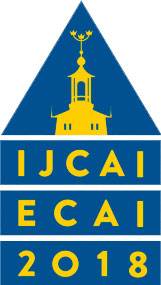Call for Papers
The Internet of Things (IoT) is the internetworking of physical devices with embedded electronics and an internet address that can transfer data with no human interaction. Examples are wearable devices, environmental sensors, machinery in factories, devices in homes and buildings, or components in a vehicle. These connected devices produce an exponentially growing amount of data. In fact, these data grow 2× faster (currently at 44E Bytes/month) than social and computer-generated data. IoT-generated data includes sensor data in time series format, image, sound and video data. Today, most of this data is not used.
This workshop will explore how AI techniques can be used to:
- Make sense of these vast amounts of IoT data
- Reason about connected physical systems and environments
- Assist humans with the execution of actions.
Hence, we solicit AI-related papers on topics such as
- IoT services composition based on semantics
- AI methods for modelling and reasoning in context
- AI methods for analysing uncertain sensor data
- AI problems while analysing massive amounts of sensor data (novel clustering and classification methods)
- AI methods for intention analysis (e.g. prediction of activities and user goals)
- Improving indoor localisation techniques using AI and ML techniques
- Cooperative and collaborative data processing in dense indoor environments (e.g., multi-agent systems, in-network processing approaches)
- Activity recognition (in particular AI approaches for infrastructure mediated and device-free passive sensing)
- AI methods for multimodal data analytics
- Intelligent reasoning in sensor-enhanced (mobile) crowd sourcing
- Ubiquitous/pervasive computing and context awareness
- AI methods to manage/improve information security in IoT systems
- IoT applications in areas such as electronics, buildings, retail, automotive
- Assisted living technologies and algorithms
- Decision support systems for field workers
As usual, the above list is not an exhaustive list but an indicative one.
Important dates
| Submission deadline | 24 April 2018 | |
| Notification of acceptance | 18 May 2018 | |
| Final version deadline | 4 June 2018 | |
| Workshop in Stockholm | 15 July 2018 |
Previous workshops
